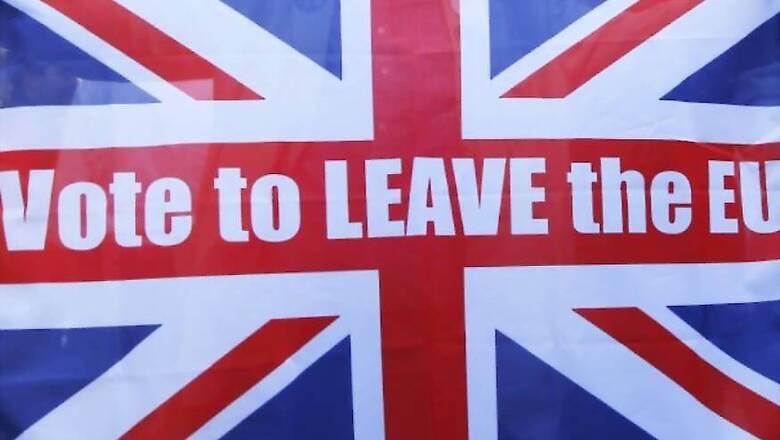
views
London: British Prime Minister Theresa May narrowly survived another crunch Brexit vote in parliament, as she struggles to unify her divided party around her strategy for leaving the European Union.
The Conservative government on Tuesday defeated an amendment introduced by its own backbench MPs to a future trade policy bill which would have kept Britain in a customs union with the EU if it fails to agree a free trade deal.
If the amendment had passed it would have thrown May's Brexit strategy into disarray and increased pressure on the already beleaguered leader. Government whips overcame the rebellion by a dozen Tory lawmakers — reportedly issuing last-ditch threats it would prompt a no-confidence vote in the prime minister — and scraped through by six votes, winning by 307 to 301.
It was bolstered by the support of four pro-Brexit opposition Labour Party MPs.
Ministers argued the amendment would put "massive restrictions" on its ability to forge "an independent trade policy" after Britain leaves the European Union next March.
International Trade Secretary Liam Fox told parliament the government's future trade bill was "an important bill providing continuity and stability".
"It will be the confident first step that the UK takes in establishing itself as an independent trading nation," he added.
The government lost another, less crucial vote on another backbench amendment calling for future participation in the European medicines regulatory network. The entire trade bill passed by 31 votes and now moves to the House of Lords for further scrutiny before returning to the Commons for a final vote.
May is battling to unite her Conservative Party around her Brexit blueprint formally unveiled last week following months of cabinet infighting.
It would see Britain ask the European Union for a free trade area for goods through a "facilitated customs arrangement" alongside a "common rulebook". Brexiteers believe that keeps Britain too close to the EU, while pro-Europeans think it fails to protect the country's dominant services sector, among other gripes. The backlash has seen the prime minister face persistent rumours Tory MPs are planning to topple her.
Two top pro-Brexit ministers, Boris Johnson and David Davis, quit in protest last week, while a string of junior walkouts have followed suit, including two more officials on Monday.
On Tuesday was also the second day running May faced revolt from backbench Tory lawmakers, after they failed on Monday by three votes to enact changes to a crucial post-Brexit customs bill.
May averted defeat on the proposed legislation — part of a series of bills overseeing Britain's withdrawal from the EU — by bowing to pressure from hardline eurosceptics in her own party.
The move infuriated pro-European Conservatives, sowing the seeds for yesterday's unsuccessful rebellion.
"I started the week intending to support the prime minister. Yesterday changed that," MP Phillip Lee, who resigned as a junior minister over Brexit earlier this year, told lawmakers.
Despite this week's legislative successes, two former British prime ministers spoke out on Tuesday about the divisive impact of Brexit.
Describing the government's approach as "a total and complete mess", Tony Blair told AFP the only way out was to hold another referendum on the issue.
"Once this thing has been started by a referendum, it can frankly only be finished by a fresh vote," Blair said.
John Major, who lost power in 1997 after years of Conservative dissent over Europe, also backs a second poll and said positions were more "entrenched" on Wednesday.
"Theresa May is in a more difficult position than I was," he told ITV News. "Facing more committed and hardline opponents — and more of them — than I had."
British voters in a June 2016 referendum chose to leave the European Union, and on Tuesday Britain's official Brexit campaign, Vote Leave, was fined and reported to the police for breaking spending rules — another issue boosting calls for a second vote.













Comments
0 comment